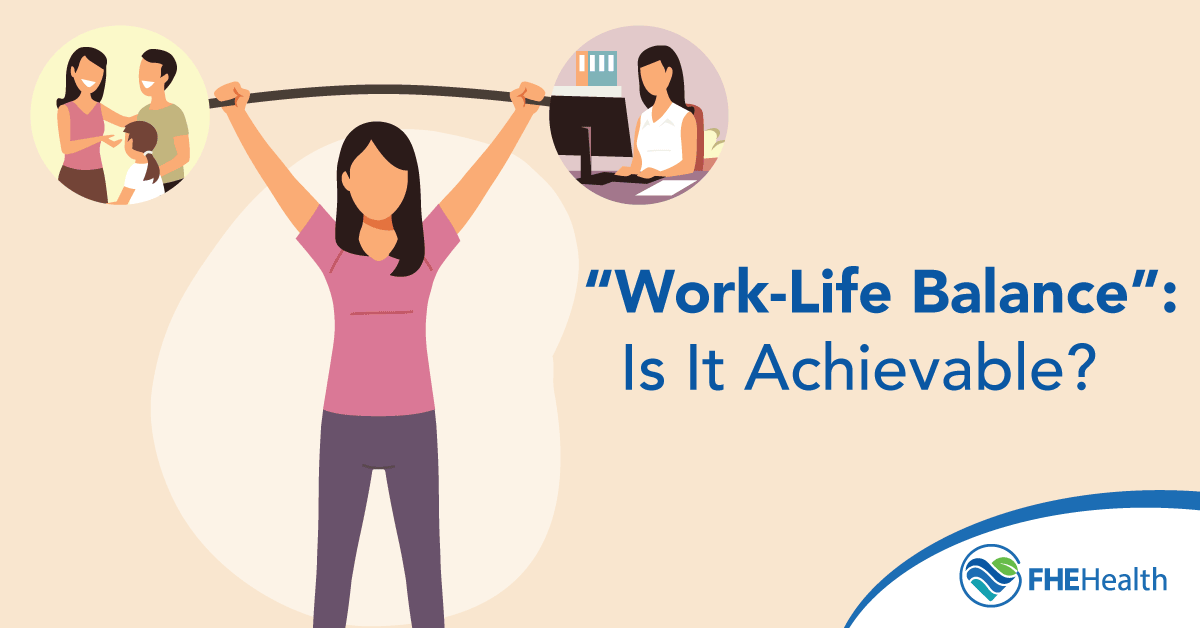
This article has been reviewed for accuracy by our peer review team which includes clinicians and medical professionals. Learn more about our peer review process.
It is a hugely popular resolution. Whether at the start of a new year or as an evergreen aspiration, more “work-life balance” is a widely sought-after, self-help goal—but is it even achievable, and if so, what does it look like? For answers to these and other questions, we reached out to Dr. Beau A. Nelson, DBH, LCSW, who is Chief Clinical Officer at FHE Health. Thanks to his training and expertise in the field of cognitive-behavioral therapy (CBT), Dr. Nelson was able to offer some fresh and unique perspectives on a familiar subject….
The Importance of Work-Life Balance

Work-life balance has been credited for better mental and physical health, among other measures of a happy and fulfilling life. For many of us, though, the concept may sound great in principle but is notoriously hard to put into practice. This reality has even sparked some debate over to what degree work-life balance is attainable, with some taking the view that work-life balance is more of a myth than a real state of being.
When we asked Dr. Nelson to weigh in on the debate, he shared his view that “there is something called ‘work-life balance’” and that “it is hard for many people to grasp because they can have so many demands on them that everything seems ‘out of sorts’ in general.”
What Is Work-Life Balance?
If work-life balance is real and achievable, what is it exactly, we wanted to know? Dr. Nelson defined it in terms of “the percentage of energy, thoughts, and emotions that you put into what you have to do versus what you want to do.” He qualified this statement by clarifying that “work can be more than just your job.”
“If your work life is what you want to do, be it raising your kids, going to a job that is meaningful, or helping others, this looks totally different,” Dr. Nelson added. “If you are miserable in either what you have to do or what you want to do, balance is not the issue—choices are. Tough choices are scary. We often avoid making them and feel stuck.”
Expert Insights on Achieving Work-Life Harmony
Work-life balance and harmony can look different depending on one’s season of life. For example, Dr. Nelson said:
It is interesting to see the studies that show that working (although maybe not necessarily at 40 hours a week) helps many older adults feel happier and healthier, more connected, and useful and productive. For those in their younger and middle years, there seem to be no boundaries between work and life (blame it on technology, I guess), and never enough time.
In a similar vein, one common misconception about work-life balance is that it depends on having less work time and more personal time, Dr. Nelson said, “as if having more non-work time will make us happier.” He continued:
Generally, our balance is not ‘thrown off’ because we just check out and misuse big parts of time or our jobs are all-consuming. Having all free time or working all the time is not what affects our balance—that is extreme all-or-nothing thinking. Rather, think of what you have the most control over, the lost time wasted watching TV rather than bonding with one’s kids, scrolling through Facebook instead of exercising, or the Internet instead of sleep at 11pm.
Balance is more than moving one or two pieces; it is about a lifestyle and about choices, diligence, and consistency. It is about how you see things and what you value. People hate their jobs until they get fired; people love that first day of being out of the office but during the pandemic the second month being at home was oppressive. Often, we can make small and satisfying changes that can make us feel better, but doing a full circle change might not be possible, or healthy.
Practical Strategies for Balancing Career and Personal Life
What practical strategies, if any, could Dr. Nelson recommend for balancing a career and personal life?
“There is no secret solution,” he said. “I wish there was.” Instead, he offered these considerations:
We are here on earth for a very short time. You would be better doing something you love for a little money than something you hate for more money (and adjust your spending accordingly). More happiness comes from relationships than from money. Being poor is not the worst thing in life. Being rich is not the secret to happiness. All we can do is try and make the best decisions with what we have—kind of like at the eye doctor: Is A better than B, or B better than C?
As further inspiration, Dr. Nelson referred to the “five simple rules for happiness” that appear on a small paperweight on his desk, which he received as a gift.
“I find it very wise,” he said, before listing those five simple rules:
- Free your heart from hatred.
- Free your mind from worries.
- Live simply.
- Give more.
- Expect less.
Final Reflections on How to Have a Balanced Life
When we asked if he had any final words of advice on how to have a balanced life, Dr. Nelson shared some reflections from his work with patients and clients through the years:
There is no childhood, mean person, trauma, disappointment, blemish, job, or other situation that is worth being miserable for our entire lives. I have had the privilege to watch people overcome addictions, abusive relationships, poor parenting, physical disabilities, economic disadvantages, and a host of other negative life events.
I am amazed at the human spirit and what it can do. If you have hope, let that be your beacon instead of fear; then there is nothing you cannot do.
Dr. Nelson concluded with this challenge: “Work is but a part of our existence. No one ever said on their deathbed, ‘I wish I had spent more time at the office or thinking about work.’ Instead, make some money, take care of yourself, spend time with people you love, and be grateful for what you have today, because in the blink of an eye it will all be over, and you will look back and wonder where the time went and why you did not live more fully and experience more.”






